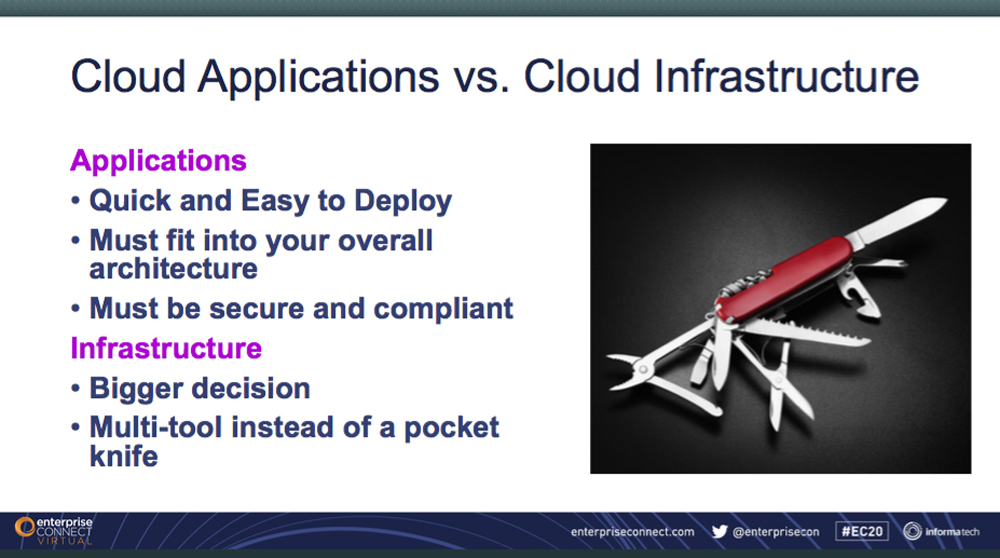While it’s easy to deploy cloud-based applications, moving the communications infrastructure to the cloud is a much bigger decision. Since many enterprises have expanded their video collaboration applications in response to the COVID-19 pandemic, now may be the time to consider other aspects of going to the cloud.

“With all the issues involved, you should take a careful look at your options,” said Melissa Swartz, founder, Swartz Consulting, at a recent Enterprise Connect virtual session, “Cloud to the Rescue: Will It Work for You?” To answer that question, Swartz offered a 16-question guide that can help organizations decide whether to retain their on-premises solutions, move to the cloud, or adopt a hybrid infrastructure.
- Do you have reliable connectivity? If you can’t ensure a reliable connection to the cloud provider, then this approach isn’t right for you, she said. “Your connection to the cloud is the biggest risk for downtime,” she added. “Therefore, a best practice is to have multiple connections to the cloud and be able to automatically route inbound and outbound traffic.
- Will the opex financial model work for your organization? A monthly subscription model from a cloud provider avoids a large upfront capital expenditure, she said. However, you may be able to depreciate that on-premise purchase over time. Organizations that do not have a steady stream of income, such as a law firm that operates on a contingency fee basis, may not want to add to their ongoing overhead expenses.
- Do you have to meet regulatory/compliance requirements for data ownership? If your data must remain under your control or with your country, then on-premise infrastructure might be the best solution. “Private cloud might be an option, but not a public cloud,” added Swartz.
- Is it important for you to manage and control the solution and upgrades? If the answer is yes, then an on-premise solution may be the right choice.
- Does your staff have the skills and time to manage your voice communications technology? If the answer is no, then it’s time to consider a cloud-based solution. But Swartz cautions that there will still be demands on your in-house team.
- Does your business continuity plan meet your needs? Cloud providers typically have multiple data centers in varied locations to support you business resilience and disaster recovery needs, Swartz said.
- Do you want to manage security and compliance? While no one is immune to data breaches, cloud providers can invest in high-quality security resources and spread the cost across many customers. “On the other hand, if you have the resources, you can control the security measures needed by your organization,” Swartz said.
- Do you have custom integrations? If not, there is no problem moving to the cloud. But take a close look at your custom applications to see if they will still be viable.
- Is there a mandate to move services to the cloud? If so, then the decision moves from “should we make a change” to “how can make the change.”
- Is your business seasonal with big surges in use? Cloud providers typically make it easier and more cost-effective to handle a surge, rather than buying more on-premise equipment and licenses.
- Is it important to have the newest voice technology? With a cloud provider, users typically get new capabilities in small bites, rather than the large upgrades typical with on-premise solutions.
- Do you have a large number or remote sites or users? With a cloud, all users are “remote.” However, on-premise solutions also support remote users, including the requirements of contact center agents.
- Is it important for your technology to be flexible and easy to change? Cloud solutions are easier to administer and adjust, since you don’t have to change the core hardware, said Swartz.
- Do you want to take advantage of capabilities like AI in the near future? Swartz said AI applications are being typically being developed on cloud solutions, offering a cost-effective approach to accessing these resources.
- Do you have a space limitation in your data center? If the answer is yes, then you should consider making a transition to the cloud.
- Do you have a contact center? Both options are available, so you should conduct a thorough needs analysis before making a decision.
Summing up her presentation, Swartz said, “As more businesses move to support a remote workforce, cloud-based solutions will play an increasing role in the market.”

i like this superb article
I got good info from your blog